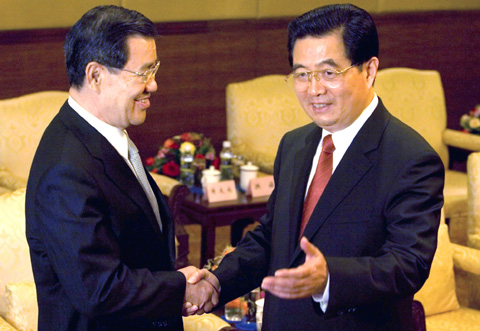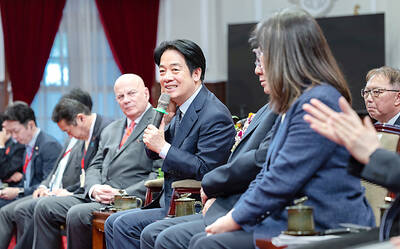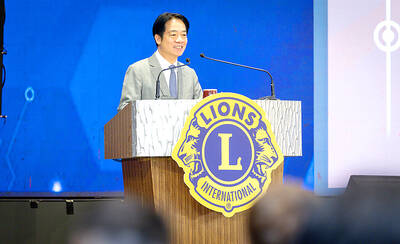Vice president-elect Vincent Siew (蕭萬長) met Chinese President Hu Jintao (胡錦濤) yesterday afternoon in Hainan, an event hailed by the US as “the best way forward” for Taiwan and China.
The meeting, held on the sideline of the Boao Forum for Asia, made Siew the highest-ranking elected Taiwanese figure to come face-to-face with a Chinese leader since 1949. Siew attended the forum in his capacity as chairman of the Cross-Strait Common Market Foundation, a non-profit organization he founded.
During 20-minutes of talks, Su and Hu said they wanted closer economic ties. They sat side by side after shaking hands and exchanging pleasantries.

PHOTO: AP
Siew, who was accompanied by a 12-member Taiwanese delegation, said that closer economic relations between China and Taiwan would facilitate regional stability and improve the lives of ordinary Taiwanese and Chinese.
Siew expressed hope that Taiwan and China would set aside their disputes with pragmatism and work together to create a bright future that will see a win-win scenario.
“Economic development is the mutual expectation of people on both sides of the Taiwan Strait,” Siew told Hu, calling himself an “old soldier” of economic policy.
Hu said he looked forward to seeing the two sides pursue a consensus amid changing social and economic situations.
“I’d like to exchange ideas with Mr Siew on the issue of economic cooperation across the Taiwan Strait,” Hu said in televised remarks.
Both avoided politics in the live broadcast portions of their meeting.
A report by China Central Television (CCTV) later yesterday said that Hu also asked Siew to send his regards to president-elect Ma Ying-jeou (馬英九), Chinese Nationalist Party (KMT) Chairman Wu Poh-hsiung (吳伯雄) and former KMT chairman Lien Chan (連戰). CCTV did not refer to the trio’s titles in its report.
Siew, a veteran of the economic forum, has attended it since 2003 and met Hu there in the past. However, the meeting this time round took on much greater significance as Siew is now vice president-elect. He will assume office on May 20.
In a brief statement after his meeting with Hu yesterday, Siew said the meeting was “very frank, friendly and achieved results,” without elaborating.
During the meeting, Siew suggested “facing reality, inventing the future, putting aside controversy and seeking a win-win situation,” said KMT Legislator Su Chi (蘇起), a member of Siew’s delegation.
Siew suggested that direct cross-strait links could start with the implementation of weekend charter flights, Su said, adding that Siew also talked of opening Taiwan to Chinese tourists, normalizing cross-strait economic relations and trade, and reviving mechanisms for cross-strait negotiation.
Later last night, Chinese authorities issued a statement on the meeting in the form of a CCTV report.
“We will continue to push for cross-strait exchanges in areas such as economy and culture, continue to push for cross-strait weekend charter flights and negotiations on issues concerning visits by Chinese to Taiwan,” CCTV reported. “We will continue to care for the wellbeing of Taiwanese compatriots, safeguard the rights of Taiwanese compatriots and push for cross-strait negotiations.”
Asked to describe the atmosphere of the meeting with Hu, Su said: “Good chemistry, harmonious chemistry.”
“We’re basically trying to break ice that is eight years thick. We want to break the ice and usher in a new period in cross-strait relations with economics, trade and investment,” he said.
Yesterday morning, Siew met former Philippine president Fidel Ramos and was expected later to hold talks with former Australian prime minister Bob Hawke.
Commenting on the meeting between Siew and Hu, Lin Chong-pin (林中斌), former vice minister of defense and president of the Taipei-based Foundation on International and Cross-strait Studies, said “the visit signals in concrete terms a beginning of detente across the Strait. So far that [detente] has only been atmospheric,” he said.
The US has endorsed the meeting and other such cross-strait meetings as “the best way forward.”
US Deputy Secretary of State John Negroponte made the comment in response to questions by Taiwanese reporters after he made a speech on US-Asia relations in Washington on Friday.
Asked about the expected Siew-Hu meeting, Negroponte said: “We believe that the best way to settle differences over the Taiwan Strait is by peaceful means and we think that dialogue between the People’s Republic of China and the authorities, the leaders in Taiwan, is the best way forward.”
“So, yes, I would say that [a Siew-Hu meeting is] a good way forward,” he said.
Earlier, in a keynote address at a conference of the US Asia Pacific Council, the Washington arm of Hawaii’s East West Center, Negroponte said that the US is “committed to the resolution of any differences that may exist between China and Taiwan over [cross-strait issues] to be settled by peaceful means.”
He also said tthat Ma’s election would help advance cross-strait dialogue.
“We think that the recent election and the rejection of the referendums that were put forward actually opens up the possibility of a new dialogue between the PRC and the political leaders of Taiwan,” Negroponte said.
“So I emphasize to you our commitment to stability, our commitment to the resolution of these issues by peaceful means and our desire to see the dialogue take place as the best way to move forward,” he said.
The statements from Negroponte echoed and augmented those by US President George W. Bush, who, in his message of congratulations to Ma on his victory, called on both sides to engage in dialogue.
Bush gave the same message to Hu five days after the election, when he telephoned Hu and stressed the need for cross-strait talks.
This new emphasis on dialogue by the Bush administration seems to reflect a sense of relief in the administration at the defeat of the Democratic Progressive Party candidate Frank Hsieh (謝長廷) and the impending end of the presidency of Chen Shui-bian (陳水扁), who has alienated the Bush administration over the years.

Two US House of Representatives committees yesterday condemned China’s attempt to orchestrate a crash involving Vice President Hsiao Bi-khim’s (蕭美琴) car when she visited the Czech Republic last year as vice president-elect. Czech local media in March last year reported that a Chinese diplomat had run a red light while following Hsiao’s car from the airport, and Czech intelligence last week told local media that Chinese diplomats and agents had also planned to stage a demonstrative car collision. Hsiao on Saturday shared a Reuters news report on the incident through her account on social media platform X and wrote: “I

‘BUILDING PARTNERSHIPS’: The US military’s aim is to continue to make any potential Chinese invasion more difficult than it already is, US General Ronald Clark said The likelihood of China invading Taiwan without contest is “very, very small” because the Taiwan Strait is under constant surveillance by multiple countries, a US general has said. General Ronald Clark, commanding officer of US Army Pacific (USARPAC), the US Army’s largest service component command, made the remarks during a dialogue hosted on Friday by Washington-based think tank the Center for Strategic and International Studies. Asked by the event host what the Chinese military has learned from its US counterpart over the years, Clark said that the first lesson is that the skill and will of US service members are “unmatched.” The second

STANDING TOGETHER: Amid China’s increasingly aggressive activities, nations must join forces in detecting and dealing with incursions, a Taiwanese official said Two senior Philippine officials and one former official yesterday attended the Taiwan International Ocean Forum in Taipei, the first high-level visit since the Philippines in April lifted a ban on such travel to Taiwan. The Ocean Affairs Council hosted the two-day event at the National Taiwan University Hospital International Convention Center. Philippine Navy spokesman Rear Admiral Roy Vincent Trinidad, Coast Guard spokesman Grand Commodore Jay Tarriela and former Philippine Presidential Communications Office assistant secretary Michel del Rosario participated in the forum. More than 100 officials, experts and entrepreneurs from 15 nations participated in the forum, which included discussions on countering China’s hybrid warfare

MORE DEMOCRACY: The only solution to Taiwan’s current democratic issues involves more democracy, including Constitutional Court rulings and citizens exercising their civil rights , Lai said The People’s Republic of China (PRC) is not the “motherland” of the Republic of China (ROC) and has never owned Taiwan, President William Lai (賴清德) said yesterday. The speech was the third in a series of 10 that Lai is scheduled to deliver across Taiwan. Taiwan is facing external threats from China, Lai said at a Lions Clubs International banquet in Hsinchu. For example, on June 21 the army detected 12 Chinese aircraft, eight of which entered Taiwanese waters, as well as six Chinese warships that remained in the waters around Taiwan, he said. Beyond military and political intimidation, Taiwan